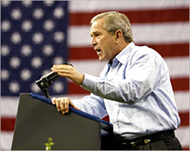Chomsky: US budget attacks majority
If you were poor, a Native American, a small farmer or an ecologist, you probably did not vote for George Bush.

It is therefore not so surprising to find that all these sectors of society have come under attack, from the Republican administration’s new fiscal budget.
However, if you were an army veteran you may have expected to escape spending cuts. But even this slice of American society, one that largely voted for Bush, finds itself the subject of financial “rollback”.
Versatile American scholar Noam Chomsky, speaking exclusively to Aljazeera, put it like this.
“There is a very simple principle that goes a long way towards explaining decisions of the Bush administration. If some policy is beneficial to wealth, privilege and power, it should be promoted.
“If some policy is beneficial to the large majority of the population but of no particular concern (or even marginally costly) to wealth, privilege and power, it should be undermined.”
Foreign adventures
The overall budget actually weighed in at $2.5 trillion. Defence spending is increased across the board, both internally in the US and for its foreign adventures.
There is a 4.8% increase on defence, plus larger increases for Homeland Security (7%) and counter-terrorism which shoots up by 17%. In total, since becoming president, Bush has increased military and defence spending by just over 40%.
 |
|
Chomsky sees Bush’s budget as |
Chomsky sees the budget not as a series of cuts but rather “to reorient (spending), so that it is even more focused on the interests of extreme wealth and power than before”.
Before these spending hikes the United States already spent more on its military than the next 15 biggest national armies combined together. Even nuclear weaponry is set to get a boost to defend the US against “new threats, terrorism, failed states” as outlined by Condoleezza Rice in her Paris speech.
President Bush also said that his budget was going to control the US national budget deficit. However, even Alan Greenspan, chairman of the US Federal Reserve, has now admitted that the imbalances in the US economy are worsened partly by tax cuts created by Bush’s administration.
Equity extraction
In a low-key speech last week Greenspan admitted that US consumption has been driven by tax cuts and “equity extraction”. This is the practice of taking on more debt on the back of rising house prices.
Indeed, the Bush administration predicts that by 2010 the US current account deficit will have amounted to a cumulative $1.257 trillion. By the same year the Bush administration tax cuts, as estimated by them, will have amounted to a cumulative $1.290 trillion.
 |
|
Higher consumer spending forms |
Public debate between a choice of tax cuts or social security are off limits, says Chomsky, as “the US (administration says it) must dismantle a very efficient social security programme which faces, at worst, trivial financial problems that could easily be overcome by measures that cannot be contemplated and are never discussed.
“Most simply, by raising … the outrageously regressive payroll tax, which means that Bill Gates pays nothing beyond the first roughly $90,000 of income.”
The new budget is also based on some premises that are open to question. On the one hand ,Greenspan was warning that “market pressures” will come to “readjust” the US economy.
On the other, administration officials basing their tax and deficit predictions on rises of 3.5% for spending, turning into an extra 6.1% in revenues for the government.
Fragile consumer
This at a time when the share of the turnover of the US from consumer spending has risen to an all-time high of just under 71%.
Yet the fragile US consumer may be about to see an end to the counter-deflationary measures of Greenspan, low interest rates and tax cuts. These were needed after the recession of 2000-2002 to bolster the flagging US market.
|
“It should be recalled that for about 25 years, wages have stagnated or declined for the majority … and incomes have been sustained only by work loads far beyond the norm in the industrial world“ Noam Chomsky,MIT Professor |
But now correctional “market pressure” could lead to a decrease in consumer spending, not a 3.5% increase. Any simultaneous popping of the housing bubble will only exacerbate these problems.
Of course such realities already exist for the Bush administration. They were prepared to attack spending, yet this has tended to be aimed at groups not traditionally part of the 30% of the US population who voted Republican.
Chomsky sees the budget as following the tradition of the Regan administration in the 1980s – deficits, tax cuts and spending rollback “guided by the same general principles, but (now) far more extreme and brutal”.
“It should be recalled that for about 25 years, wages have stagnated or declined for the majority … and incomes have been sustained only by work loads far beyond the norm in the industrial world, while the top few percent have become enriched beyond the dreams of avarice.”
Schemes cut
While public education is to be scaled back by 1%, $2 billion is to come from high schools. Programmes to help poor and ethnic minority students gain university places have been scrapped.
So has the ‘Even Start’ programme which teaches reading and writing to children of parents who cannot read and write. Anti-drug programmes have also been cut, saving around $500m.
 |
|
Defence expenditure has been |
The US health system known as Medicaid, primarily for the elderly poor, is also to come under scrutiny. The current US government has called for a $60bn reduction in the next 10 years.
Training medical staff has taken a huge hit, with a specific 33% reduction in the training of some paediatric doctors.
“A completely fraudulent ‘Social Security crisis’ has been manufactured,” says Chomsky. “With a very impressive level of brazen deceit. A huge public-relations campaign has succeeded in convincing many people, especially young people, that the system is crashing into an iceberg.”
America’s native population, the weakest in society, is also seeing in excess of $100m worth of cuts, 5%. About 250,000 people will no longer be eligible for food stamps.
Death knell
Child care is to be frozen at current levels. Meanwhile the death knell is sounding for America’s small farmers as subsidies to them are to be slashed by $8.2 billion, opening the way for giant agribusiness farms to swallow them whole.
|
“The administration’s opponents are the large majority of the US population. The general ‘starve the beast’ strategy is hardly concealed, though |
Nuclear clean-ups, the Environmental Agency and National Parks are to see their budgets cut. Even energy bill assistance for the poor is to be cut by over 8%. This at a time when many Americans are finding it hard to pay their current demands, on average 22% higher than twelve months ago.
But perhaps most surprising are the cuts in assistance to US military veterans. Some of whom will who see a 114% increase in their long term drug bills, plus a one-off $250 subscription fee.
As well as a reduction in the number of nursing home places held for them. Do these cuts fit with the idea of opponents coming under fiscal attack?
“The administration’s opponents are the large majority of the US population,” says Chomsky. “The general ‘starve the beast’ strategy is hardly concealed, though few are willing to tell the truth. Namely, that the ‘beast’ they have in mind is the “great beast”, to borrow the phrase of the Founding Fathers, the dangerous public.”